Summative Assessment 1: Personal Development Report and Analysis
VerifiedAdded on 2023/01/09
|12
|3606
|53
Report
AI Summary
This comprehensive report delves into the multifaceted realm of personal development, offering a detailed exploration of strategies to enhance personal competence. The report begins with an introduction that defines personal development and its significance, followed by a diary documenting performance. Section A focuses on skills activity, outlining methods to develop personal competence, including leveraging organizational policies, feedback, and effective communication with diverse stakeholders. Section B presents a Q&A format, addressing critical aspects of self-evaluation, development opportunities, work-life balance, and learning styles. Section C encompasses a performance activity, including a diary entry and a Personal Development Plan (PDP). The report concludes with a concise summary of the key takeaways, offering valuable insights into personal and professional growth.
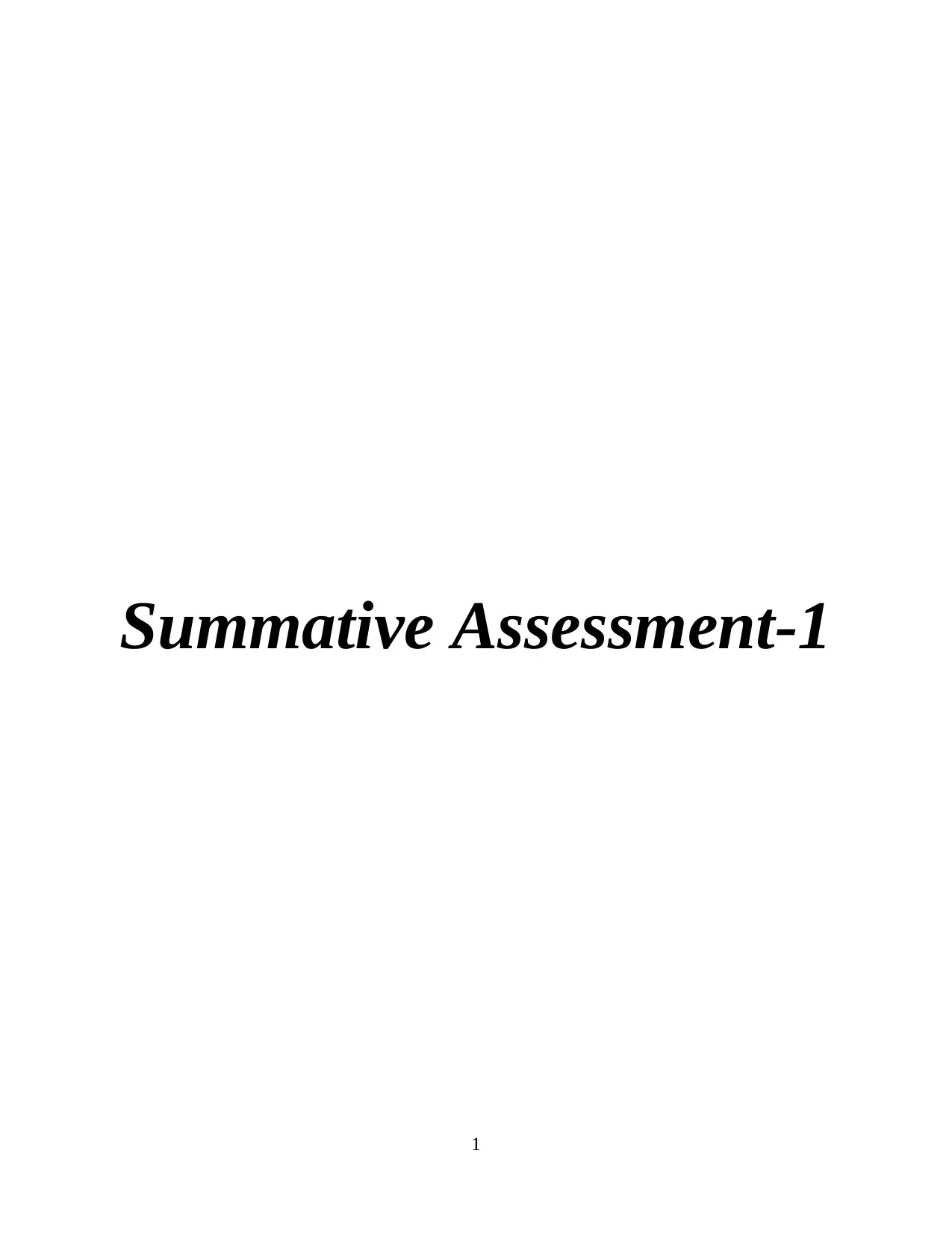
Summative Assessment-1
1
1
Paraphrase This Document
Need a fresh take? Get an instant paraphrase of this document with our AI Paraphraser
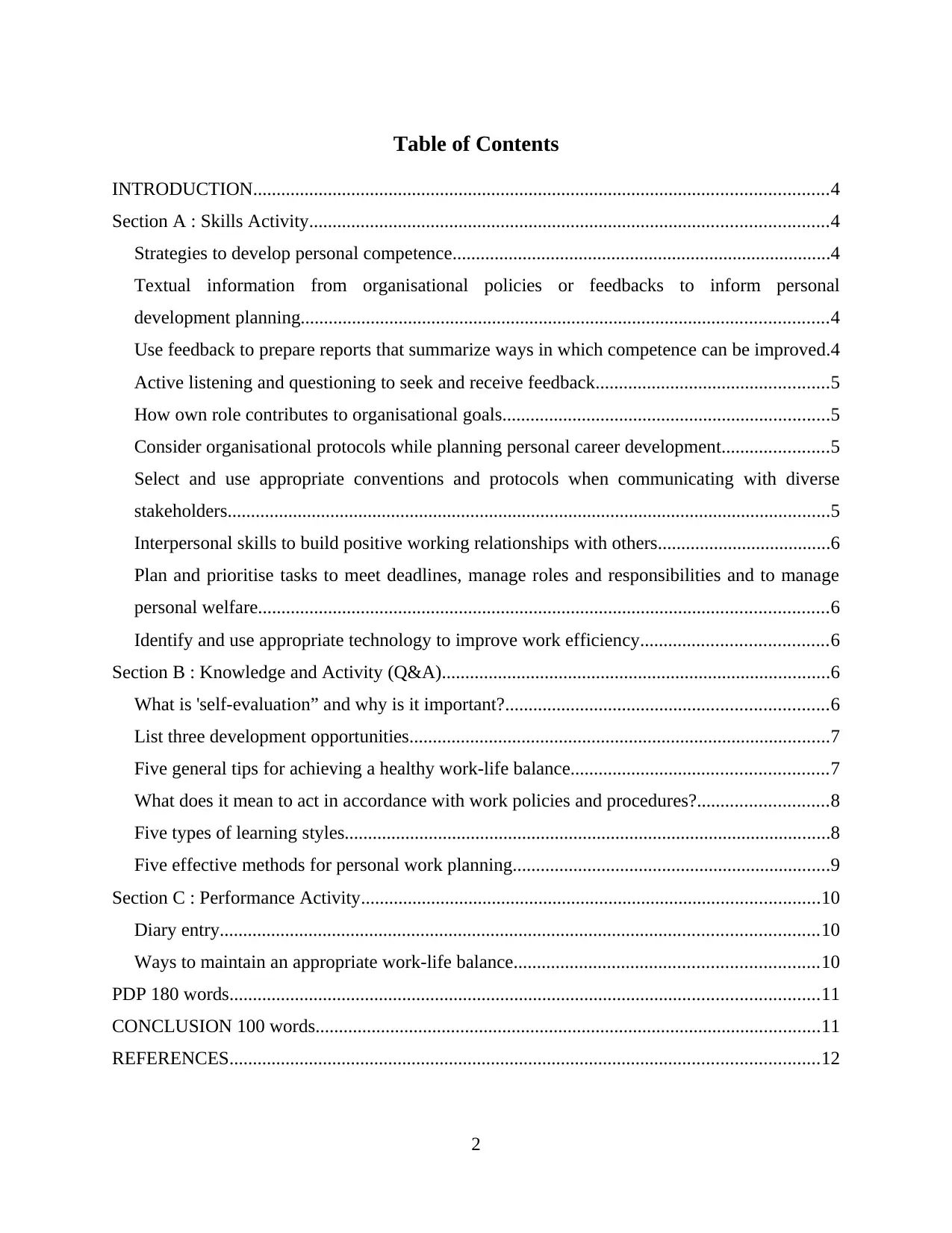
Table of Contents
INTRODUCTION...........................................................................................................................4
Section A : Skills Activity...............................................................................................................4
Strategies to develop personal competence.................................................................................4
Textual information from organisational policies or feedbacks to inform personal
development planning.................................................................................................................4
Use feedback to prepare reports that summarize ways in which competence can be improved.4
Active listening and questioning to seek and receive feedback..................................................5
How own role contributes to organisational goals......................................................................5
Consider organisational protocols while planning personal career development.......................5
Select and use appropriate conventions and protocols when communicating with diverse
stakeholders.................................................................................................................................5
Interpersonal skills to build positive working relationships with others.....................................6
Plan and prioritise tasks to meet deadlines, manage roles and responsibilities and to manage
personal welfare..........................................................................................................................6
Identify and use appropriate technology to improve work efficiency........................................6
Section B : Knowledge and Activity (Q&A)...................................................................................6
What is 'self-evaluation” and why is it important?.....................................................................6
List three development opportunities..........................................................................................7
Five general tips for achieving a healthy work-life balance.......................................................7
What does it mean to act in accordance with work policies and procedures?............................8
Five types of learning styles........................................................................................................8
Five effective methods for personal work planning....................................................................9
Section C : Performance Activity..................................................................................................10
Diary entry................................................................................................................................10
Ways to maintain an appropriate work-life balance.................................................................10
PDP 180 words..............................................................................................................................11
CONCLUSION 100 words............................................................................................................11
REFERENCES..............................................................................................................................12
2
INTRODUCTION...........................................................................................................................4
Section A : Skills Activity...............................................................................................................4
Strategies to develop personal competence.................................................................................4
Textual information from organisational policies or feedbacks to inform personal
development planning.................................................................................................................4
Use feedback to prepare reports that summarize ways in which competence can be improved.4
Active listening and questioning to seek and receive feedback..................................................5
How own role contributes to organisational goals......................................................................5
Consider organisational protocols while planning personal career development.......................5
Select and use appropriate conventions and protocols when communicating with diverse
stakeholders.................................................................................................................................5
Interpersonal skills to build positive working relationships with others.....................................6
Plan and prioritise tasks to meet deadlines, manage roles and responsibilities and to manage
personal welfare..........................................................................................................................6
Identify and use appropriate technology to improve work efficiency........................................6
Section B : Knowledge and Activity (Q&A)...................................................................................6
What is 'self-evaluation” and why is it important?.....................................................................6
List three development opportunities..........................................................................................7
Five general tips for achieving a healthy work-life balance.......................................................7
What does it mean to act in accordance with work policies and procedures?............................8
Five types of learning styles........................................................................................................8
Five effective methods for personal work planning....................................................................9
Section C : Performance Activity..................................................................................................10
Diary entry................................................................................................................................10
Ways to maintain an appropriate work-life balance.................................................................10
PDP 180 words..............................................................................................................................11
CONCLUSION 100 words............................................................................................................11
REFERENCES..............................................................................................................................12
2
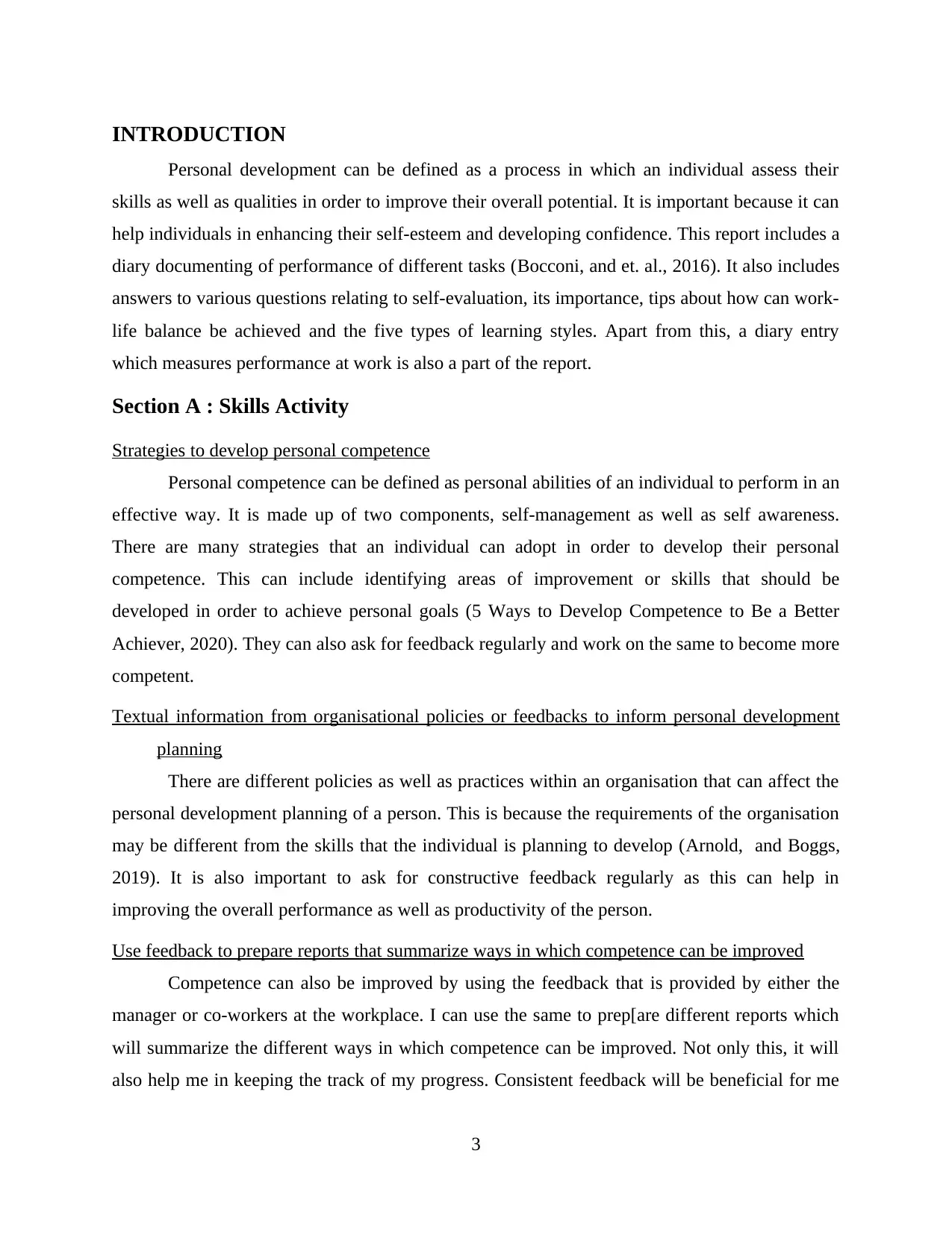
INTRODUCTION
Personal development can be defined as a process in which an individual assess their
skills as well as qualities in order to improve their overall potential. It is important because it can
help individuals in enhancing their self-esteem and developing confidence. This report includes a
diary documenting of performance of different tasks (Bocconi, and et. al., 2016). It also includes
answers to various questions relating to self-evaluation, its importance, tips about how can work-
life balance be achieved and the five types of learning styles. Apart from this, a diary entry
which measures performance at work is also a part of the report.
Section A : Skills Activity
Strategies to develop personal competence
Personal competence can be defined as personal abilities of an individual to perform in an
effective way. It is made up of two components, self-management as well as self awareness.
There are many strategies that an individual can adopt in order to develop their personal
competence. This can include identifying areas of improvement or skills that should be
developed in order to achieve personal goals (5 Ways to Develop Competence to Be a Better
Achiever, 2020). They can also ask for feedback regularly and work on the same to become more
competent.
Textual information from organisational policies or feedbacks to inform personal development
planning
There are different policies as well as practices within an organisation that can affect the
personal development planning of a person. This is because the requirements of the organisation
may be different from the skills that the individual is planning to develop (Arnold, and Boggs,
2019). It is also important to ask for constructive feedback regularly as this can help in
improving the overall performance as well as productivity of the person.
Use feedback to prepare reports that summarize ways in which competence can be improved
Competence can also be improved by using the feedback that is provided by either the
manager or co-workers at the workplace. I can use the same to prep[are different reports which
will summarize the different ways in which competence can be improved. Not only this, it will
also help me in keeping the track of my progress. Consistent feedback will be beneficial for me
3
Personal development can be defined as a process in which an individual assess their
skills as well as qualities in order to improve their overall potential. It is important because it can
help individuals in enhancing their self-esteem and developing confidence. This report includes a
diary documenting of performance of different tasks (Bocconi, and et. al., 2016). It also includes
answers to various questions relating to self-evaluation, its importance, tips about how can work-
life balance be achieved and the five types of learning styles. Apart from this, a diary entry
which measures performance at work is also a part of the report.
Section A : Skills Activity
Strategies to develop personal competence
Personal competence can be defined as personal abilities of an individual to perform in an
effective way. It is made up of two components, self-management as well as self awareness.
There are many strategies that an individual can adopt in order to develop their personal
competence. This can include identifying areas of improvement or skills that should be
developed in order to achieve personal goals (5 Ways to Develop Competence to Be a Better
Achiever, 2020). They can also ask for feedback regularly and work on the same to become more
competent.
Textual information from organisational policies or feedbacks to inform personal development
planning
There are different policies as well as practices within an organisation that can affect the
personal development planning of a person. This is because the requirements of the organisation
may be different from the skills that the individual is planning to develop (Arnold, and Boggs,
2019). It is also important to ask for constructive feedback regularly as this can help in
improving the overall performance as well as productivity of the person.
Use feedback to prepare reports that summarize ways in which competence can be improved
Competence can also be improved by using the feedback that is provided by either the
manager or co-workers at the workplace. I can use the same to prep[are different reports which
will summarize the different ways in which competence can be improved. Not only this, it will
also help me in keeping the track of my progress. Consistent feedback will be beneficial for me
3
⊘ This is a preview!⊘
Do you want full access?
Subscribe today to unlock all pages.

Trusted by 1+ million students worldwide
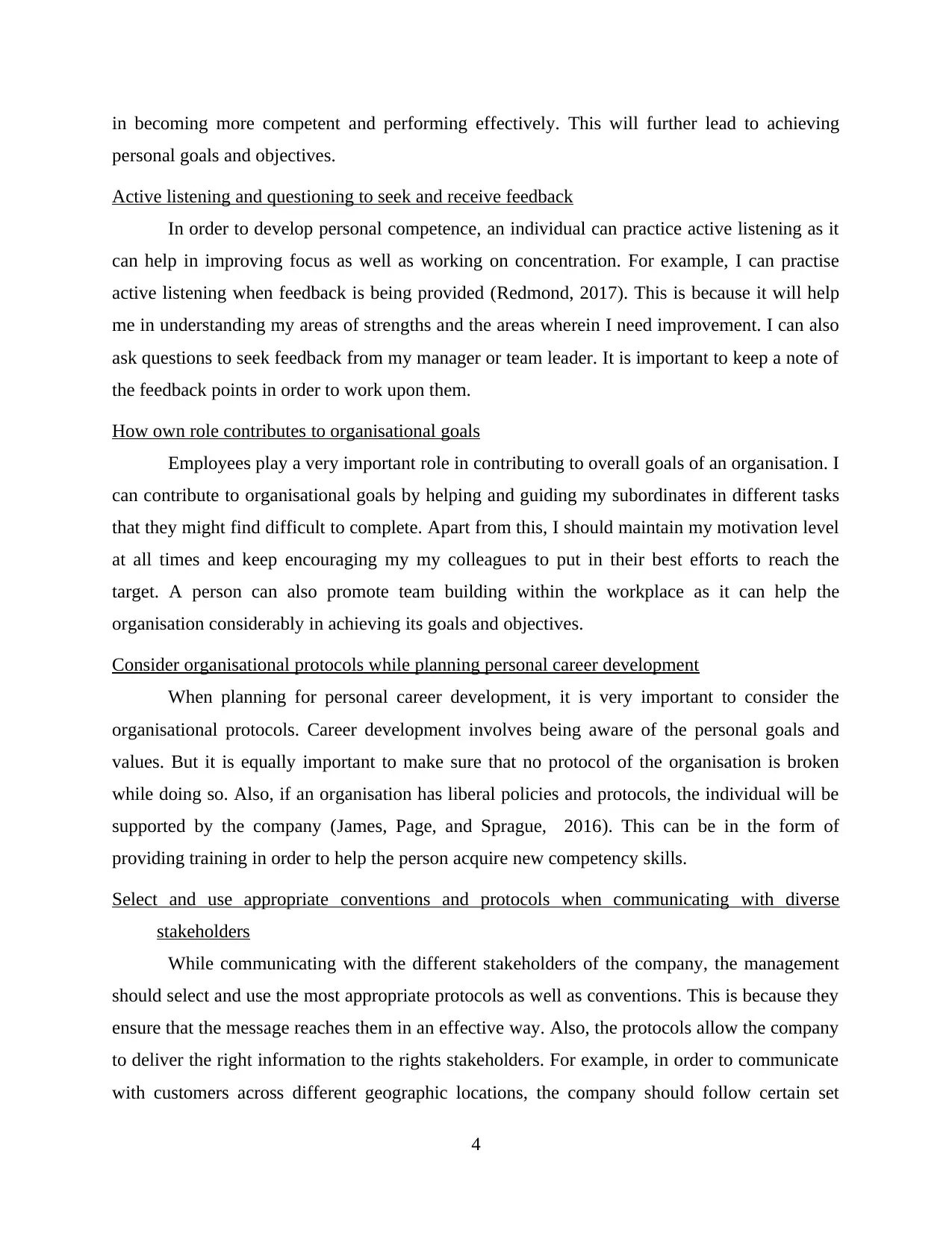
in becoming more competent and performing effectively. This will further lead to achieving
personal goals and objectives.
Active listening and questioning to seek and receive feedback
In order to develop personal competence, an individual can practice active listening as it
can help in improving focus as well as working on concentration. For example, I can practise
active listening when feedback is being provided (Redmond, 2017). This is because it will help
me in understanding my areas of strengths and the areas wherein I need improvement. I can also
ask questions to seek feedback from my manager or team leader. It is important to keep a note of
the feedback points in order to work upon them.
How own role contributes to organisational goals
Employees play a very important role in contributing to overall goals of an organisation. I
can contribute to organisational goals by helping and guiding my subordinates in different tasks
that they might find difficult to complete. Apart from this, I should maintain my motivation level
at all times and keep encouraging my my colleagues to put in their best efforts to reach the
target. A person can also promote team building within the workplace as it can help the
organisation considerably in achieving its goals and objectives.
Consider organisational protocols while planning personal career development
When planning for personal career development, it is very important to consider the
organisational protocols. Career development involves being aware of the personal goals and
values. But it is equally important to make sure that no protocol of the organisation is broken
while doing so. Also, if an organisation has liberal policies and protocols, the individual will be
supported by the company (James, Page, and Sprague, 2016). This can be in the form of
providing training in order to help the person acquire new competency skills.
Select and use appropriate conventions and protocols when communicating with diverse
stakeholders
While communicating with the different stakeholders of the company, the management
should select and use the most appropriate protocols as well as conventions. This is because they
ensure that the message reaches them in an effective way. Also, the protocols allow the company
to deliver the right information to the rights stakeholders. For example, in order to communicate
with customers across different geographic locations, the company should follow certain set
4
personal goals and objectives.
Active listening and questioning to seek and receive feedback
In order to develop personal competence, an individual can practice active listening as it
can help in improving focus as well as working on concentration. For example, I can practise
active listening when feedback is being provided (Redmond, 2017). This is because it will help
me in understanding my areas of strengths and the areas wherein I need improvement. I can also
ask questions to seek feedback from my manager or team leader. It is important to keep a note of
the feedback points in order to work upon them.
How own role contributes to organisational goals
Employees play a very important role in contributing to overall goals of an organisation. I
can contribute to organisational goals by helping and guiding my subordinates in different tasks
that they might find difficult to complete. Apart from this, I should maintain my motivation level
at all times and keep encouraging my my colleagues to put in their best efforts to reach the
target. A person can also promote team building within the workplace as it can help the
organisation considerably in achieving its goals and objectives.
Consider organisational protocols while planning personal career development
When planning for personal career development, it is very important to consider the
organisational protocols. Career development involves being aware of the personal goals and
values. But it is equally important to make sure that no protocol of the organisation is broken
while doing so. Also, if an organisation has liberal policies and protocols, the individual will be
supported by the company (James, Page, and Sprague, 2016). This can be in the form of
providing training in order to help the person acquire new competency skills.
Select and use appropriate conventions and protocols when communicating with diverse
stakeholders
While communicating with the different stakeholders of the company, the management
should select and use the most appropriate protocols as well as conventions. This is because they
ensure that the message reaches them in an effective way. Also, the protocols allow the company
to deliver the right information to the rights stakeholders. For example, in order to communicate
with customers across different geographic locations, the company should follow certain set
4
Paraphrase This Document
Need a fresh take? Get an instant paraphrase of this document with our AI Paraphraser
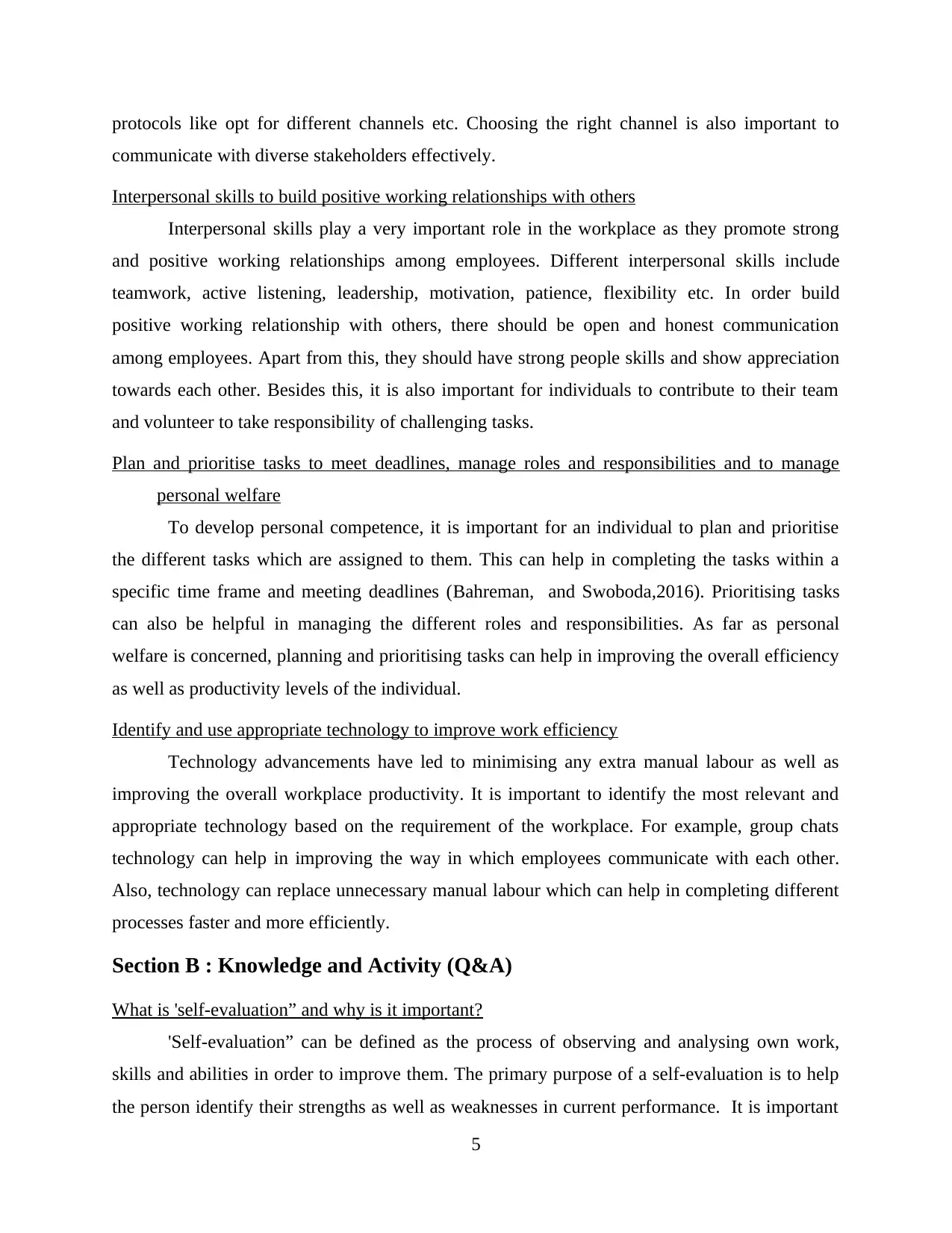
protocols like opt for different channels etc. Choosing the right channel is also important to
communicate with diverse stakeholders effectively.
Interpersonal skills to build positive working relationships with others
Interpersonal skills play a very important role in the workplace as they promote strong
and positive working relationships among employees. Different interpersonal skills include
teamwork, active listening, leadership, motivation, patience, flexibility etc. In order build
positive working relationship with others, there should be open and honest communication
among employees. Apart from this, they should have strong people skills and show appreciation
towards each other. Besides this, it is also important for individuals to contribute to their team
and volunteer to take responsibility of challenging tasks.
Plan and prioritise tasks to meet deadlines, manage roles and responsibilities and to manage
personal welfare
To develop personal competence, it is important for an individual to plan and prioritise
the different tasks which are assigned to them. This can help in completing the tasks within a
specific time frame and meeting deadlines (Bahreman, and Swoboda,2016). Prioritising tasks
can also be helpful in managing the different roles and responsibilities. As far as personal
welfare is concerned, planning and prioritising tasks can help in improving the overall efficiency
as well as productivity levels of the individual.
Identify and use appropriate technology to improve work efficiency
Technology advancements have led to minimising any extra manual labour as well as
improving the overall workplace productivity. It is important to identify the most relevant and
appropriate technology based on the requirement of the workplace. For example, group chats
technology can help in improving the way in which employees communicate with each other.
Also, technology can replace unnecessary manual labour which can help in completing different
processes faster and more efficiently.
Section B : Knowledge and Activity (Q&A)
What is 'self-evaluation” and why is it important?
'Self-evaluation” can be defined as the process of observing and analysing own work,
skills and abilities in order to improve them. The primary purpose of a self-evaluation is to help
the person identify their strengths as well as weaknesses in current performance. It is important
5
communicate with diverse stakeholders effectively.
Interpersonal skills to build positive working relationships with others
Interpersonal skills play a very important role in the workplace as they promote strong
and positive working relationships among employees. Different interpersonal skills include
teamwork, active listening, leadership, motivation, patience, flexibility etc. In order build
positive working relationship with others, there should be open and honest communication
among employees. Apart from this, they should have strong people skills and show appreciation
towards each other. Besides this, it is also important for individuals to contribute to their team
and volunteer to take responsibility of challenging tasks.
Plan and prioritise tasks to meet deadlines, manage roles and responsibilities and to manage
personal welfare
To develop personal competence, it is important for an individual to plan and prioritise
the different tasks which are assigned to them. This can help in completing the tasks within a
specific time frame and meeting deadlines (Bahreman, and Swoboda,2016). Prioritising tasks
can also be helpful in managing the different roles and responsibilities. As far as personal
welfare is concerned, planning and prioritising tasks can help in improving the overall efficiency
as well as productivity levels of the individual.
Identify and use appropriate technology to improve work efficiency
Technology advancements have led to minimising any extra manual labour as well as
improving the overall workplace productivity. It is important to identify the most relevant and
appropriate technology based on the requirement of the workplace. For example, group chats
technology can help in improving the way in which employees communicate with each other.
Also, technology can replace unnecessary manual labour which can help in completing different
processes faster and more efficiently.
Section B : Knowledge and Activity (Q&A)
What is 'self-evaluation” and why is it important?
'Self-evaluation” can be defined as the process of observing and analysing own work,
skills and abilities in order to improve them. The primary purpose of a self-evaluation is to help
the person identify their strengths as well as weaknesses in current performance. It is important
5
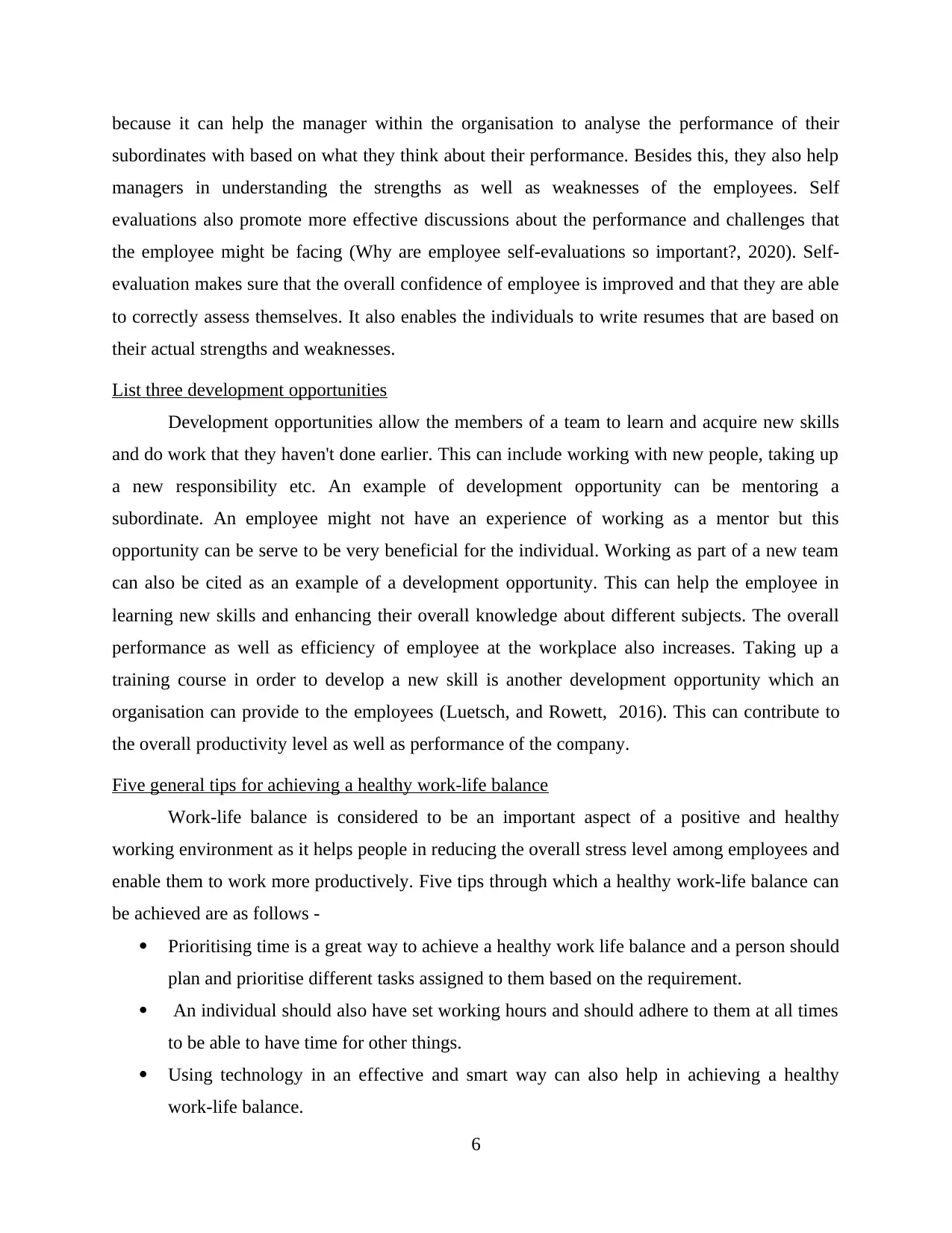
because it can help the manager within the organisation to analyse the performance of their
subordinates with based on what they think about their performance. Besides this, they also help
managers in understanding the strengths as well as weaknesses of the employees. Self
evaluations also promote more effective discussions about the performance and challenges that
the employee might be facing (Why are employee self-evaluations so important?, 2020). Self-
evaluation makes sure that the overall confidence of employee is improved and that they are able
to correctly assess themselves. It also enables the individuals to write resumes that are based on
their actual strengths and weaknesses.
List three development opportunities
Development opportunities allow the members of a team to learn and acquire new skills
and do work that they haven't done earlier. This can include working with new people, taking up
a new responsibility etc. An example of development opportunity can be mentoring a
subordinate. An employee might not have an experience of working as a mentor but this
opportunity can be serve to be very beneficial for the individual. Working as part of a new team
can also be cited as an example of a development opportunity. This can help the employee in
learning new skills and enhancing their overall knowledge about different subjects. The overall
performance as well as efficiency of employee at the workplace also increases. Taking up a
training course in order to develop a new skill is another development opportunity which an
organisation can provide to the employees (Luetsch, and Rowett, 2016). This can contribute to
the overall productivity level as well as performance of the company.
Five general tips for achieving a healthy work-life balance
Work-life balance is considered to be an important aspect of a positive and healthy
working environment as it helps people in reducing the overall stress level among employees and
enable them to work more productively. Five tips through which a healthy work-life balance can
be achieved are as follows -
Prioritising time is a great way to achieve a healthy work life balance and a person should
plan and prioritise different tasks assigned to them based on the requirement.
An individual should also have set working hours and should adhere to them at all times
to be able to have time for other things.
Using technology in an effective and smart way can also help in achieving a healthy
work-life balance.
6
subordinates with based on what they think about their performance. Besides this, they also help
managers in understanding the strengths as well as weaknesses of the employees. Self
evaluations also promote more effective discussions about the performance and challenges that
the employee might be facing (Why are employee self-evaluations so important?, 2020). Self-
evaluation makes sure that the overall confidence of employee is improved and that they are able
to correctly assess themselves. It also enables the individuals to write resumes that are based on
their actual strengths and weaknesses.
List three development opportunities
Development opportunities allow the members of a team to learn and acquire new skills
and do work that they haven't done earlier. This can include working with new people, taking up
a new responsibility etc. An example of development opportunity can be mentoring a
subordinate. An employee might not have an experience of working as a mentor but this
opportunity can be serve to be very beneficial for the individual. Working as part of a new team
can also be cited as an example of a development opportunity. This can help the employee in
learning new skills and enhancing their overall knowledge about different subjects. The overall
performance as well as efficiency of employee at the workplace also increases. Taking up a
training course in order to develop a new skill is another development opportunity which an
organisation can provide to the employees (Luetsch, and Rowett, 2016). This can contribute to
the overall productivity level as well as performance of the company.
Five general tips for achieving a healthy work-life balance
Work-life balance is considered to be an important aspect of a positive and healthy
working environment as it helps people in reducing the overall stress level among employees and
enable them to work more productively. Five tips through which a healthy work-life balance can
be achieved are as follows -
Prioritising time is a great way to achieve a healthy work life balance and a person should
plan and prioritise different tasks assigned to them based on the requirement.
An individual should also have set working hours and should adhere to them at all times
to be able to have time for other things.
Using technology in an effective and smart way can also help in achieving a healthy
work-life balance.
6
⊘ This is a preview!⊘
Do you want full access?
Subscribe today to unlock all pages.

Trusted by 1+ million students worldwide
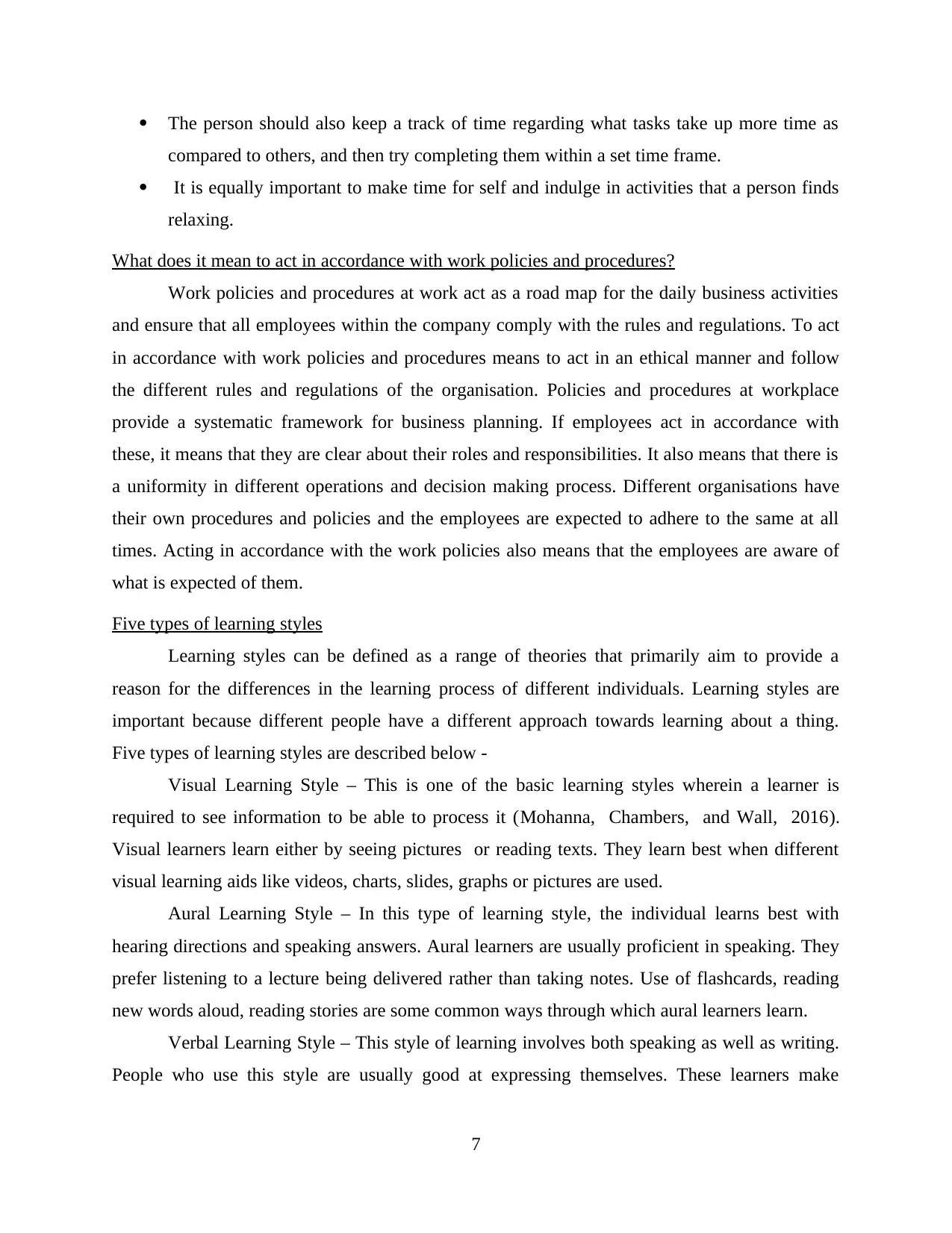
The person should also keep a track of time regarding what tasks take up more time as
compared to others, and then try completing them within a set time frame.
It is equally important to make time for self and indulge in activities that a person finds
relaxing.
What does it mean to act in accordance with work policies and procedures?
Work policies and procedures at work act as a road map for the daily business activities
and ensure that all employees within the company comply with the rules and regulations. To act
in accordance with work policies and procedures means to act in an ethical manner and follow
the different rules and regulations of the organisation. Policies and procedures at workplace
provide a systematic framework for business planning. If employees act in accordance with
these, it means that they are clear about their roles and responsibilities. It also means that there is
a uniformity in different operations and decision making process. Different organisations have
their own procedures and policies and the employees are expected to adhere to the same at all
times. Acting in accordance with the work policies also means that the employees are aware of
what is expected of them.
Five types of learning styles
Learning styles can be defined as a range of theories that primarily aim to provide a
reason for the differences in the learning process of different individuals. Learning styles are
important because different people have a different approach towards learning about a thing.
Five types of learning styles are described below -
Visual Learning Style – This is one of the basic learning styles wherein a learner is
required to see information to be able to process it (Mohanna, Chambers, and Wall, 2016).
Visual learners learn either by seeing pictures or reading texts. They learn best when different
visual learning aids like videos, charts, slides, graphs or pictures are used.
Aural Learning Style – In this type of learning style, the individual learns best with
hearing directions and speaking answers. Aural learners are usually proficient in speaking. They
prefer listening to a lecture being delivered rather than taking notes. Use of flashcards, reading
new words aloud, reading stories are some common ways through which aural learners learn.
Verbal Learning Style – This style of learning involves both speaking as well as writing.
People who use this style are usually good at expressing themselves. These learners make
7
compared to others, and then try completing them within a set time frame.
It is equally important to make time for self and indulge in activities that a person finds
relaxing.
What does it mean to act in accordance with work policies and procedures?
Work policies and procedures at work act as a road map for the daily business activities
and ensure that all employees within the company comply with the rules and regulations. To act
in accordance with work policies and procedures means to act in an ethical manner and follow
the different rules and regulations of the organisation. Policies and procedures at workplace
provide a systematic framework for business planning. If employees act in accordance with
these, it means that they are clear about their roles and responsibilities. It also means that there is
a uniformity in different operations and decision making process. Different organisations have
their own procedures and policies and the employees are expected to adhere to the same at all
times. Acting in accordance with the work policies also means that the employees are aware of
what is expected of them.
Five types of learning styles
Learning styles can be defined as a range of theories that primarily aim to provide a
reason for the differences in the learning process of different individuals. Learning styles are
important because different people have a different approach towards learning about a thing.
Five types of learning styles are described below -
Visual Learning Style – This is one of the basic learning styles wherein a learner is
required to see information to be able to process it (Mohanna, Chambers, and Wall, 2016).
Visual learners learn either by seeing pictures or reading texts. They learn best when different
visual learning aids like videos, charts, slides, graphs or pictures are used.
Aural Learning Style – In this type of learning style, the individual learns best with
hearing directions and speaking answers. Aural learners are usually proficient in speaking. They
prefer listening to a lecture being delivered rather than taking notes. Use of flashcards, reading
new words aloud, reading stories are some common ways through which aural learners learn.
Verbal Learning Style – This style of learning involves both speaking as well as writing.
People who use this style are usually good at expressing themselves. These learners make
7
Paraphrase This Document
Need a fresh take? Get an instant paraphrase of this document with our AI Paraphraser
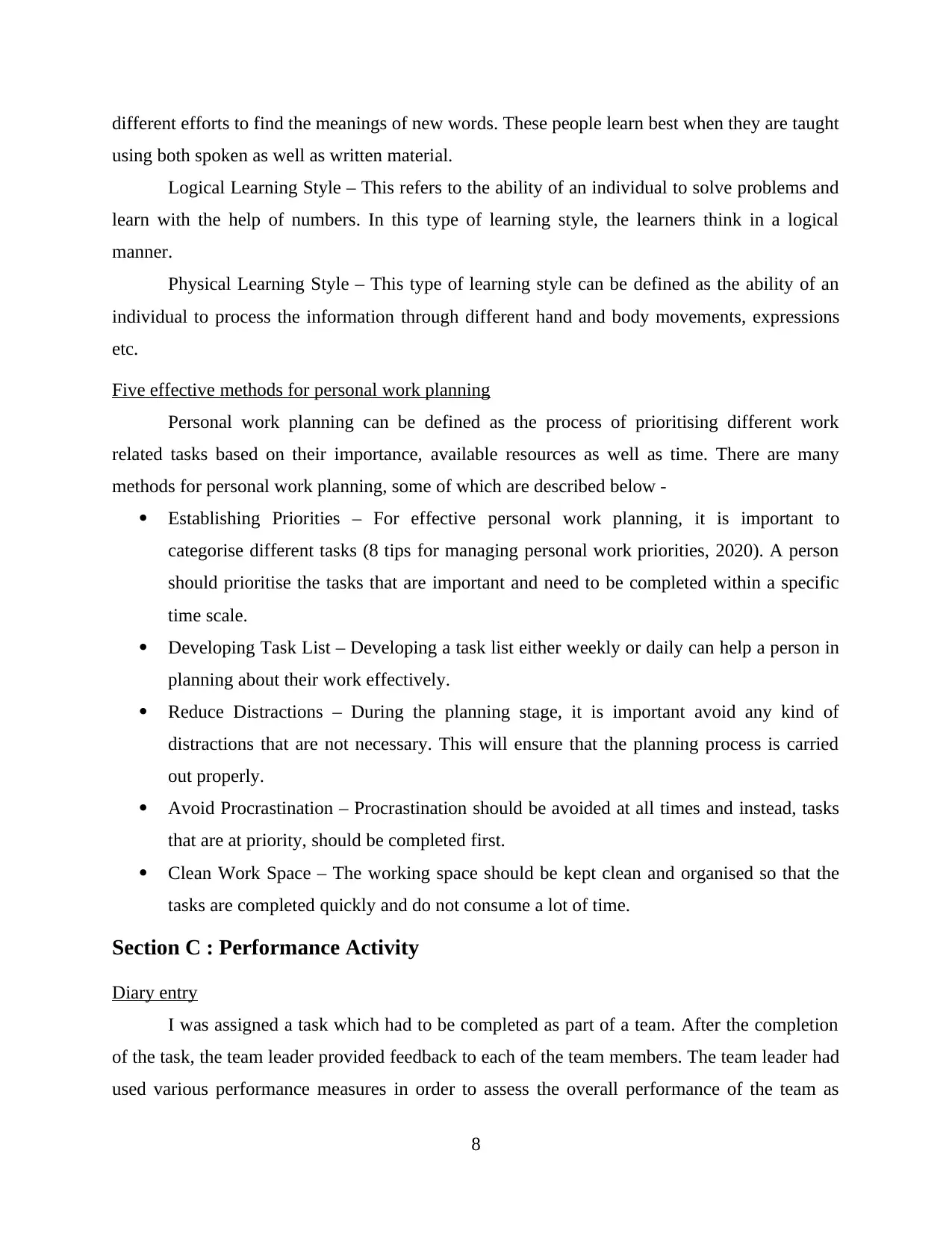
different efforts to find the meanings of new words. These people learn best when they are taught
using both spoken as well as written material.
Logical Learning Style – This refers to the ability of an individual to solve problems and
learn with the help of numbers. In this type of learning style, the learners think in a logical
manner.
Physical Learning Style – This type of learning style can be defined as the ability of an
individual to process the information through different hand and body movements, expressions
etc.
Five effective methods for personal work planning
Personal work planning can be defined as the process of prioritising different work
related tasks based on their importance, available resources as well as time. There are many
methods for personal work planning, some of which are described below -
Establishing Priorities – For effective personal work planning, it is important to
categorise different tasks (8 tips for managing personal work priorities, 2020). A person
should prioritise the tasks that are important and need to be completed within a specific
time scale.
Developing Task List – Developing a task list either weekly or daily can help a person in
planning about their work effectively.
Reduce Distractions – During the planning stage, it is important avoid any kind of
distractions that are not necessary. This will ensure that the planning process is carried
out properly.
Avoid Procrastination – Procrastination should be avoided at all times and instead, tasks
that are at priority, should be completed first.
Clean Work Space – The working space should be kept clean and organised so that the
tasks are completed quickly and do not consume a lot of time.
Section C : Performance Activity
Diary entry
I was assigned a task which had to be completed as part of a team. After the completion
of the task, the team leader provided feedback to each of the team members. The team leader had
used various performance measures in order to assess the overall performance of the team as
8
using both spoken as well as written material.
Logical Learning Style – This refers to the ability of an individual to solve problems and
learn with the help of numbers. In this type of learning style, the learners think in a logical
manner.
Physical Learning Style – This type of learning style can be defined as the ability of an
individual to process the information through different hand and body movements, expressions
etc.
Five effective methods for personal work planning
Personal work planning can be defined as the process of prioritising different work
related tasks based on their importance, available resources as well as time. There are many
methods for personal work planning, some of which are described below -
Establishing Priorities – For effective personal work planning, it is important to
categorise different tasks (8 tips for managing personal work priorities, 2020). A person
should prioritise the tasks that are important and need to be completed within a specific
time scale.
Developing Task List – Developing a task list either weekly or daily can help a person in
planning about their work effectively.
Reduce Distractions – During the planning stage, it is important avoid any kind of
distractions that are not necessary. This will ensure that the planning process is carried
out properly.
Avoid Procrastination – Procrastination should be avoided at all times and instead, tasks
that are at priority, should be completed first.
Clean Work Space – The working space should be kept clean and organised so that the
tasks are completed quickly and do not consume a lot of time.
Section C : Performance Activity
Diary entry
I was assigned a task which had to be completed as part of a team. After the completion
of the task, the team leader provided feedback to each of the team members. The team leader had
used various performance measures in order to assess the overall performance of the team as
8
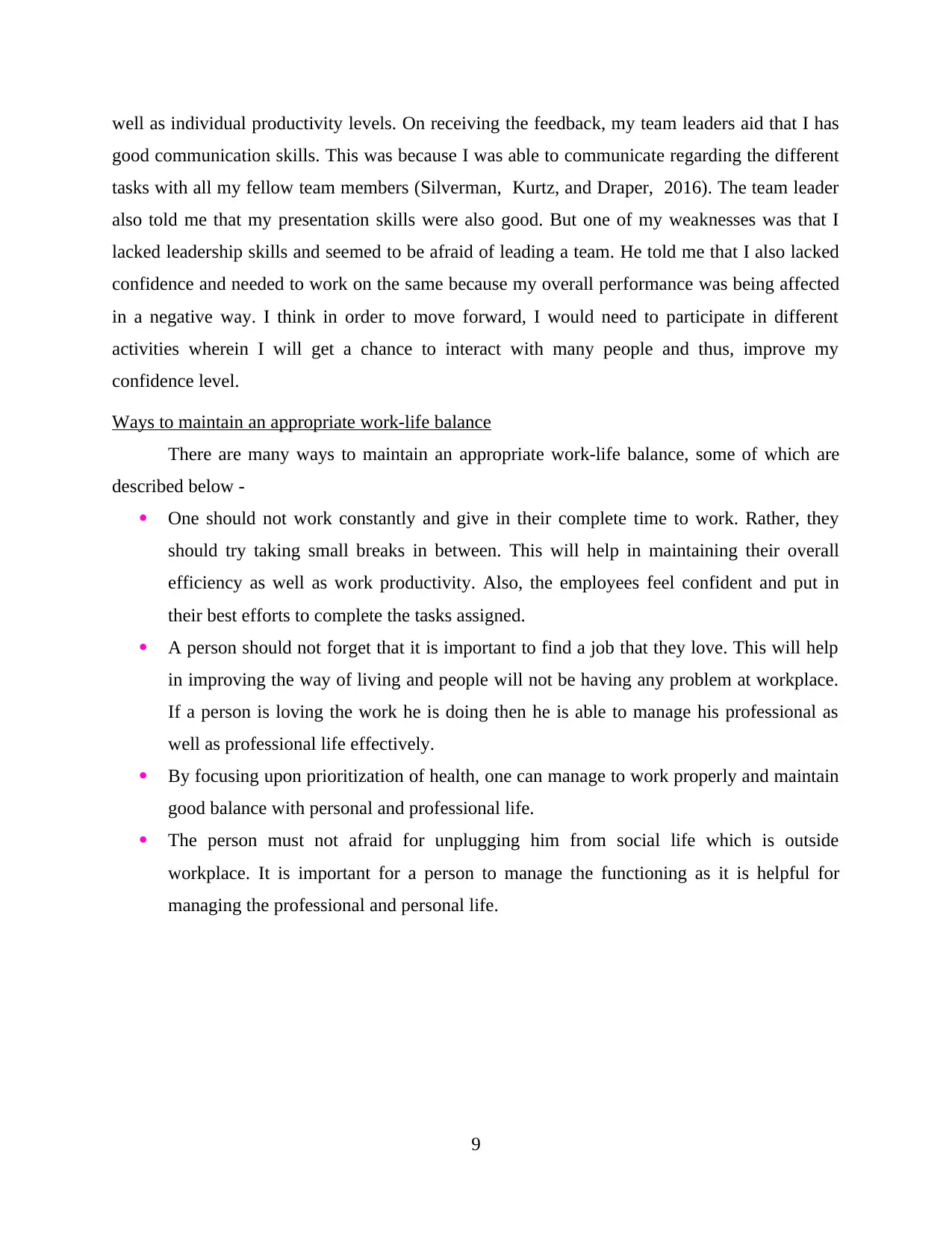
well as individual productivity levels. On receiving the feedback, my team leaders aid that I has
good communication skills. This was because I was able to communicate regarding the different
tasks with all my fellow team members (Silverman, Kurtz, and Draper, 2016). The team leader
also told me that my presentation skills were also good. But one of my weaknesses was that I
lacked leadership skills and seemed to be afraid of leading a team. He told me that I also lacked
confidence and needed to work on the same because my overall performance was being affected
in a negative way. I think in order to move forward, I would need to participate in different
activities wherein I will get a chance to interact with many people and thus, improve my
confidence level.
Ways to maintain an appropriate work-life balance
There are many ways to maintain an appropriate work-life balance, some of which are
described below -
One should not work constantly and give in their complete time to work. Rather, they
should try taking small breaks in between. This will help in maintaining their overall
efficiency as well as work productivity. Also, the employees feel confident and put in
their best efforts to complete the tasks assigned.
A person should not forget that it is important to find a job that they love. This will help
in improving the way of living and people will not be having any problem at workplace.
If a person is loving the work he is doing then he is able to manage his professional as
well as professional life effectively.
By focusing upon prioritization of health, one can manage to work properly and maintain
good balance with personal and professional life.
The person must not afraid for unplugging him from social life which is outside
workplace. It is important for a person to manage the functioning as it is helpful for
managing the professional and personal life.
9
good communication skills. This was because I was able to communicate regarding the different
tasks with all my fellow team members (Silverman, Kurtz, and Draper, 2016). The team leader
also told me that my presentation skills were also good. But one of my weaknesses was that I
lacked leadership skills and seemed to be afraid of leading a team. He told me that I also lacked
confidence and needed to work on the same because my overall performance was being affected
in a negative way. I think in order to move forward, I would need to participate in different
activities wherein I will get a chance to interact with many people and thus, improve my
confidence level.
Ways to maintain an appropriate work-life balance
There are many ways to maintain an appropriate work-life balance, some of which are
described below -
One should not work constantly and give in their complete time to work. Rather, they
should try taking small breaks in between. This will help in maintaining their overall
efficiency as well as work productivity. Also, the employees feel confident and put in
their best efforts to complete the tasks assigned.
A person should not forget that it is important to find a job that they love. This will help
in improving the way of living and people will not be having any problem at workplace.
If a person is loving the work he is doing then he is able to manage his professional as
well as professional life effectively.
By focusing upon prioritization of health, one can manage to work properly and maintain
good balance with personal and professional life.
The person must not afraid for unplugging him from social life which is outside
workplace. It is important for a person to manage the functioning as it is helpful for
managing the professional and personal life.
9
⊘ This is a preview!⊘
Do you want full access?
Subscribe today to unlock all pages.

Trusted by 1+ million students worldwide
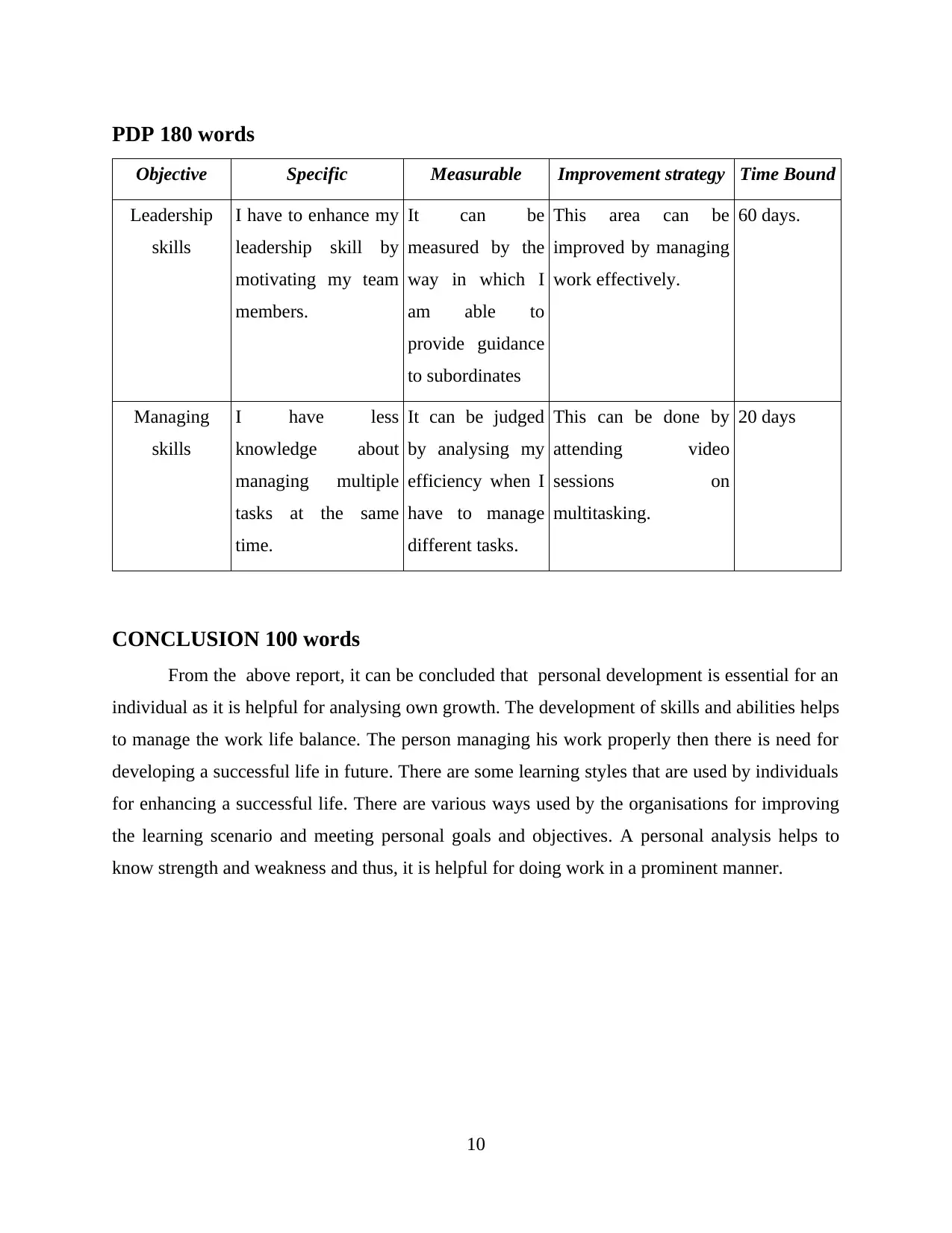
PDP 180 words
Objective Specific Measurable Improvement strategy Time Bound
Leadership
skills
I have to enhance my
leadership skill by
motivating my team
members.
It can be
measured by the
way in which I
am able to
provide guidance
to subordinates
This area can be
improved by managing
work effectively.
60 days.
Managing
skills
I have less
knowledge about
managing multiple
tasks at the same
time.
It can be judged
by analysing my
efficiency when I
have to manage
different tasks.
This can be done by
attending video
sessions on
multitasking.
20 days
CONCLUSION 100 words
From the above report, it can be concluded that personal development is essential for an
individual as it is helpful for analysing own growth. The development of skills and abilities helps
to manage the work life balance. The person managing his work properly then there is need for
developing a successful life in future. There are some learning styles that are used by individuals
for enhancing a successful life. There are various ways used by the organisations for improving
the learning scenario and meeting personal goals and objectives. A personal analysis helps to
know strength and weakness and thus, it is helpful for doing work in a prominent manner.
10
Objective Specific Measurable Improvement strategy Time Bound
Leadership
skills
I have to enhance my
leadership skill by
motivating my team
members.
It can be
measured by the
way in which I
am able to
provide guidance
to subordinates
This area can be
improved by managing
work effectively.
60 days.
Managing
skills
I have less
knowledge about
managing multiple
tasks at the same
time.
It can be judged
by analysing my
efficiency when I
have to manage
different tasks.
This can be done by
attending video
sessions on
multitasking.
20 days
CONCLUSION 100 words
From the above report, it can be concluded that personal development is essential for an
individual as it is helpful for analysing own growth. The development of skills and abilities helps
to manage the work life balance. The person managing his work properly then there is need for
developing a successful life in future. There are some learning styles that are used by individuals
for enhancing a successful life. There are various ways used by the organisations for improving
the learning scenario and meeting personal goals and objectives. A personal analysis helps to
know strength and weakness and thus, it is helpful for doing work in a prominent manner.
10
Paraphrase This Document
Need a fresh take? Get an instant paraphrase of this document with our AI Paraphraser
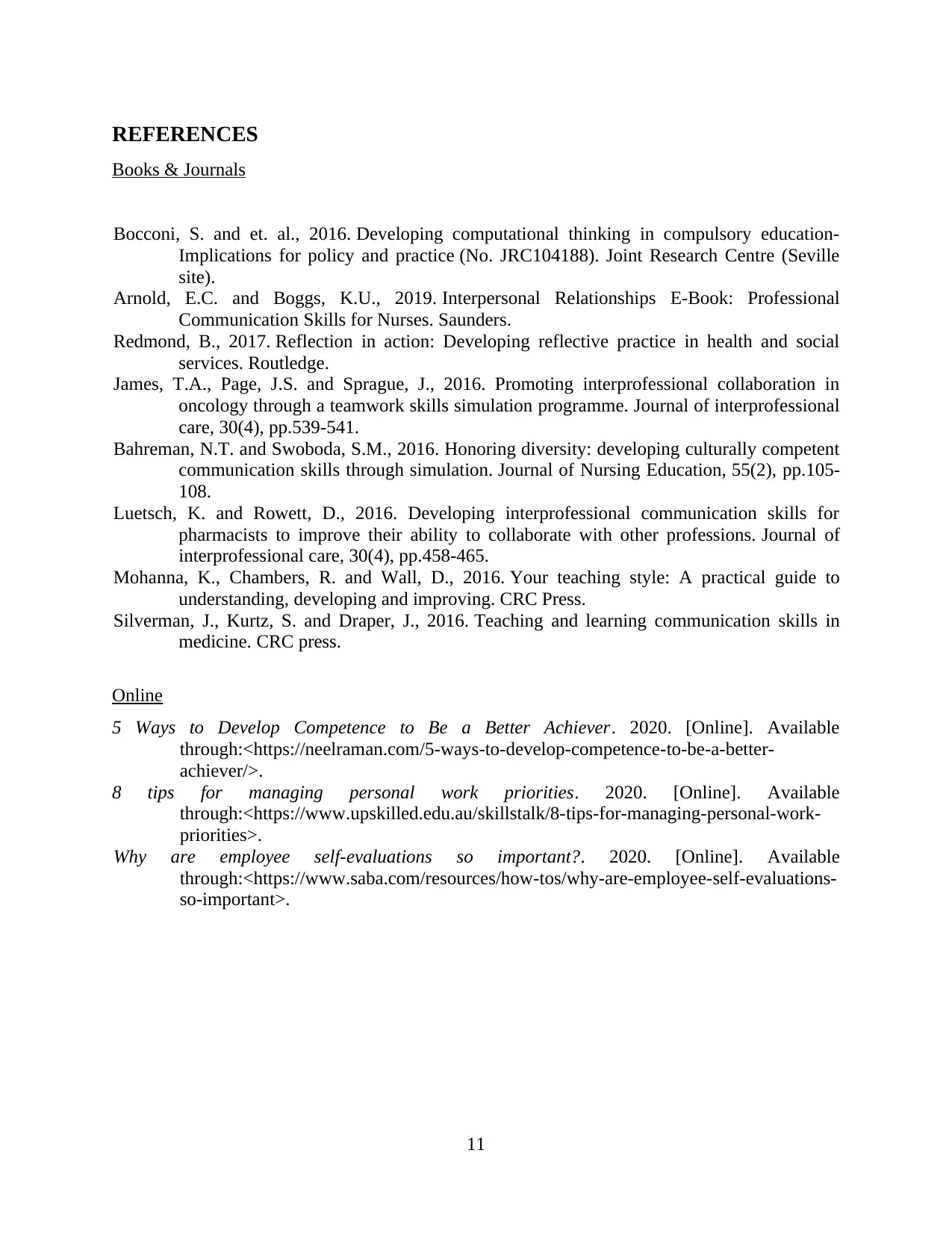
REFERENCES
Books & Journals
Bocconi, S. and et. al., 2016. Developing computational thinking in compulsory education-
Implications for policy and practice (No. JRC104188). Joint Research Centre (Seville
site).
Arnold, E.C. and Boggs, K.U., 2019. Interpersonal Relationships E-Book: Professional
Communication Skills for Nurses. Saunders.
Redmond, B., 2017. Reflection in action: Developing reflective practice in health and social
services. Routledge.
James, T.A., Page, J.S. and Sprague, J., 2016. Promoting interprofessional collaboration in
oncology through a teamwork skills simulation programme. Journal of interprofessional
care, 30(4), pp.539-541.
Bahreman, N.T. and Swoboda, S.M., 2016. Honoring diversity: developing culturally competent
communication skills through simulation. Journal of Nursing Education, 55(2), pp.105-
108.
Luetsch, K. and Rowett, D., 2016. Developing interprofessional communication skills for
pharmacists to improve their ability to collaborate with other professions. Journal of
interprofessional care, 30(4), pp.458-465.
Mohanna, K., Chambers, R. and Wall, D., 2016. Your teaching style: A practical guide to
understanding, developing and improving. CRC Press.
Silverman, J., Kurtz, S. and Draper, J., 2016. Teaching and learning communication skills in
medicine. CRC press.
Online
5 Ways to Develop Competence to Be a Better Achiever. 2020. [Online]. Available
through:<https://neelraman.com/5-ways-to-develop-competence-to-be-a-better-
achiever/>.
8 tips for managing personal work priorities. 2020. [Online]. Available
through:<https://www.upskilled.edu.au/skillstalk/8-tips-for-managing-personal-work-
priorities>.
Why are employee self-evaluations so important?. 2020. [Online]. Available
through:<https://www.saba.com/resources/how-tos/why-are-employee-self-evaluations-
so-important>.
11
Books & Journals
Bocconi, S. and et. al., 2016. Developing computational thinking in compulsory education-
Implications for policy and practice (No. JRC104188). Joint Research Centre (Seville
site).
Arnold, E.C. and Boggs, K.U., 2019. Interpersonal Relationships E-Book: Professional
Communication Skills for Nurses. Saunders.
Redmond, B., 2017. Reflection in action: Developing reflective practice in health and social
services. Routledge.
James, T.A., Page, J.S. and Sprague, J., 2016. Promoting interprofessional collaboration in
oncology through a teamwork skills simulation programme. Journal of interprofessional
care, 30(4), pp.539-541.
Bahreman, N.T. and Swoboda, S.M., 2016. Honoring diversity: developing culturally competent
communication skills through simulation. Journal of Nursing Education, 55(2), pp.105-
108.
Luetsch, K. and Rowett, D., 2016. Developing interprofessional communication skills for
pharmacists to improve their ability to collaborate with other professions. Journal of
interprofessional care, 30(4), pp.458-465.
Mohanna, K., Chambers, R. and Wall, D., 2016. Your teaching style: A practical guide to
understanding, developing and improving. CRC Press.
Silverman, J., Kurtz, S. and Draper, J., 2016. Teaching and learning communication skills in
medicine. CRC press.
Online
5 Ways to Develop Competence to Be a Better Achiever. 2020. [Online]. Available
through:<https://neelraman.com/5-ways-to-develop-competence-to-be-a-better-
achiever/>.
8 tips for managing personal work priorities. 2020. [Online]. Available
through:<https://www.upskilled.edu.au/skillstalk/8-tips-for-managing-personal-work-
priorities>.
Why are employee self-evaluations so important?. 2020. [Online]. Available
through:<https://www.saba.com/resources/how-tos/why-are-employee-self-evaluations-
so-important>.
11

12
⊘ This is a preview!⊘
Do you want full access?
Subscribe today to unlock all pages.

Trusted by 1+ million students worldwide
1 out of 12
Related Documents
Your All-in-One AI-Powered Toolkit for Academic Success.
+13062052269
info@desklib.com
Available 24*7 on WhatsApp / Email
![[object Object]](/_next/static/media/star-bottom.7253800d.svg)
Unlock your academic potential
Copyright © 2020–2026 A2Z Services. All Rights Reserved. Developed and managed by ZUCOL.




